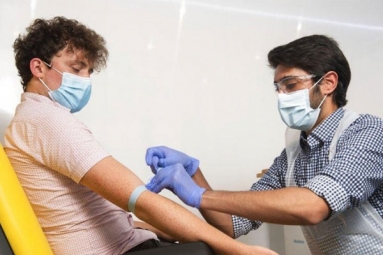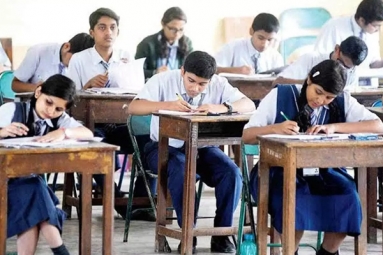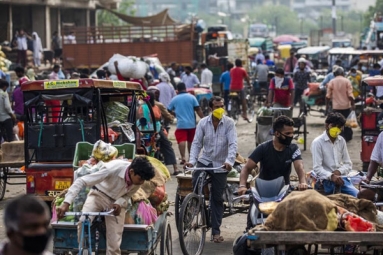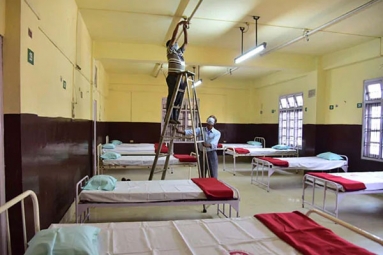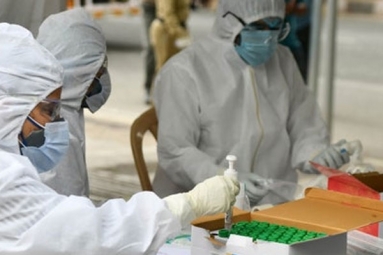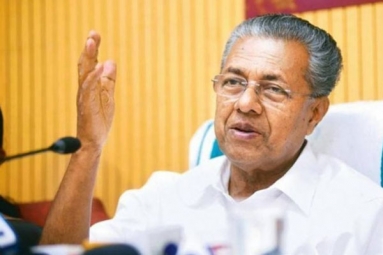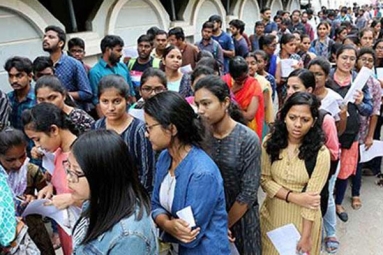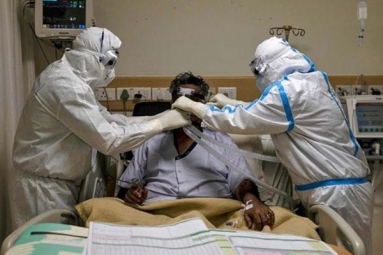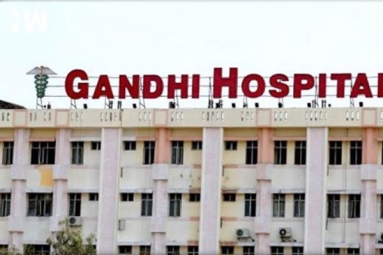North Koreans ordered to hand over pet dogs for meat amid food shortages August 19, 2020 18:34
Dog meat is considered a delicacy in North Korea and parts of South Korea. However, a traumatic order comes from Kim Jong-un that pet dogs must be handed over at meat shops amid food crisis. Kim Jong-un, the North Korean leader has been running dictatorship for long and is issuing bizarre orders to people. As the food crisis seems dominant in the country, he has issued another unprecedented order. Pet dogs are treated as family members in the households but Kim Jong-un seems insensitive towards emotions. He had ordered people to give away their pet dogs at meat shops so that they can be turned into meat for restaurants. North Korea is currently facing a food supply crisis. According to a report in the New Zealand Herald, this bizarre move by the North Korean leader is supposed to be aimed at quelling the rising discontent among people as the economic condition in the country is crumbling and food shortage has become a worry. Kim Jong-un also seems to be playing to the emotions of ordinary and poor people as the latter own pigs and other forms of livestock while only the elite class owns dogs and other domesticated pets. In July, he banned the ownership of pet dogs by the higher class people saying it is a tainted trend of bourgeois ideology. As per reports, the government officials are identifying the households with pet dogs and are forcing them to denounce their pets. Some of the dogs are being sent to the state-run zoo’s and others being sold out to restaurants. Though pet owners are cursing Kim John-un behind his back as they have very little to do on his decision. Dog meat is considered a delicacy and an appetizing dish, however, the trend is gradually decreasing in Korea. But, it is not a dead tradition and continues to survive sporadically. Almost 1 million dogs are reared on farms to be consumed every year in South Korea. A recent report from the UN stated that as much as 60% of North Korea which is estimated that 25.5 million people are facing widespread food shortages and have been worsened after the International sanctions imposed on the regime for its nuclear missile programs. Moreover, flooding due to heavy rains in North Korea has caused severe damage to the paddy crops and the coronavirus pandemic has caused the food supply to suffer. China too has a similar food shortage problem and the Chinese Vice Premier Hu Chunhua recently asked the governors of each province in the country to make sure that the crop yield is not lowered this year or they would be severely punished. By Gayatri Yellayi
Read MoreOxford's COVID-19 vaccine trials to start in Mumbai: All you need to know August 18, 2020 20:09
Oxford’s COVISHIELD vaccine’s phase 2 and 3 trials will begin in Mumbai’s King George hospital by the end of August. The King Edward memorial hospital in Parel, Mumbai will soon start the phase 2 and 3 of human trials of the Oxford’s and AstraZeneca’s COVID-19 vaccine Covishield. India is among the handful of the countries where human trials for this vaccine are being carried out outside of the UK. Dr. Hemant Deshmukh, dean of the King George hospital spoke to India Today and said that the trials would begin by the end of August. Covishield has bagged the world’s attention after it showed promising results in the phase 1 human trials conducted in the United Kingdom. In a latest development, ICMR has granted approval to Mumbai’s King George Memorial hospital to conduct phase 2 and 3 trials of the Oxford University’s coronavirus vaccine. As per latest reports, the Mumbai’s hospital has already started enrolling volunteers for the trial process. Here are some of the details of the Phase 2 and 3 trials to be conducted in Mumbai: How many people will participate in the trials? According to King Edward hospital, a total of 160 healthy people from Mumbai will take part in the phase 2 and 3 trials of COVISHIELD. Who all are eligible for the trials? Dr. Hemant Deshmukh said that anyone above 18 years of age with no ailments or any persistent diseases are eligible to volunteer for the trials. Can the COVID-19 positive patients participate? The hospital rules state that the person participating in the human trials should not have been exposed to COVID-19. Moreover, the hospital staff will be carrying out the RT-PCR test on all participants to ensure none of them are infected with the virus. Can recovered patients participate? As the recovered people will already develop the antibodies in their immune system they will not be allowed to participate in the human trials of phase 2 and phase 3. How will the trials be conducted? The trials will be carried out on an outpatient basis which means the participants need not get admitted to the hospital. An intramuscular injection will be given and the participants may suffer with mild fever after getting the injection shots. How can people opt for trials? The King George Memorial hospital staff has already been receiving calls of participants willing to take the shots and the hospital has given two dedicated numbers- 24133767 and 24174420 for people who want to enquire on their eligibility for the trials. The phase 2 and 3 of the Oxford’s vaccine will be carried out at 10 centers in India for which 1600 people will be roped in to participate. By Gayatri Yellayi
Read MoreCBSE to hold Compartment exams for classes 10, 12 in September August 14, 2020 15:03
CBSE has declared the final exam results for class 10 and 12 in July this year. The students have been evaluated by their scores in the pre-final and internal examinations. CBSE holds compartment exams every year for class 10 and 12 students after result declaration every year. The board will give a chance to those students who were not able to pass in the final examinations to reappear in these compartment exams as no student would wish to repeat the same class in the next academic year. In general, a candidate who has appeared in the mains exam and has scored below the level marks will be automatically placed in the compartment list by the CBSE board. The candidate can appear for the compartment exam in July the same year of result declaration or second chance would be given in March/April next year and a third chance in July of next year. This year CBSE will be issuing two circulars for appearing in the compartment exams. CBSE board on Thursday said that compartment or improvement examinations are proposed to be conducted in September 2020 for the candidates who have got their results in July 2020. Two circulars will be issued by the board- one for regular candidates appearing through schools and the other candidates applying privately through CBSE website. The CBSE said that for class 12 regular students who appeared in February/March 2020 through schools affiliated to the board and have been placed in the compartment list are eligible to apply only for one subject which was placed in the compartment. Meanwhile, for Class 10 regular candidates who appeared in February/March through schools affiliated to the board and have been declared as a compartment are eligible to apply in one or more subjects which were placed in the compartment. The normal fee that would be levied by the CBSE board for Class 10 or 12 compartmental examinations is Rs. 300 for the schools in India. For the schools outside India, the fees would be Rs.2000 per subject. The schedule for online submission of fees for class 10 and 12 students is from August 13 5 pm to August 20. Candidates if missed this deadline, can pay late fee of Rs. 2000 in addition to the regular fee for late submissions up to 5 pm on August 22. By Gayatri Yellayi
Read MoreGovt Issues Guidelines for Reopening of Gyms and Yoga Centers: What Should You Know? August 04, 2020 19:37
Before you hit your gym once again, make sure you follow these guidelines issued by the government. Gyms and Yoga centers will reopen from August 5. As a part of Unlock 3.0, the ministry of Health and Family welfare on Monday issued guidelines for reopening of gyms and how should they function. It is important to heed to the point that Centre doesn’t recommend people to step out of their houses except for essential needs. Here are the new guidelines you need to follow to make sure you could stay away from contracting COVID-19. All the gymnasiums and yoga centers will remain closed in the containment areas of the country. Only asymptomatic people will be allowed to enter the premises of gyms and yoga institutes. People above 65 years, people with ailments, pregnant women and children below 10 years will not be allowed. Those people either staff or the members not wearing face masks will not be allowed to enter the gyms. Individuals must maintain a minimum of 6 feet distance inside the centers. Everyone must practice hand washing frequently though there is no presence of dirt. Face masks can be removed while performing exercises or doing yoga as the use of masks while exercising can cause breathing difficulty. Spas, steam bath and swimming pools will be closed. The floor area of 4 square meters per person must be planned. Equipment including cardio and strength machines must be placed 6 feet apart to ensure social distancing. If feasible, try to relocate the equipment to outdoor areas. All the surfaces and areas shall be disinfected with using clinically approved disinfectants every now and then. Ensure 6 feet distance between trainer and customers during the training sessions whenever feasible. Ensure to conduct sessions that do not include personal contact between trainer and the client including the set up and the use of equipment. Limit the number of clients per session to ensure adequate distancing. The temperature setting of all air conditioners inside the premises of gyms must be between 24 to 30 degrees Celsius. Relative humidity should be in the range of 40 to 70 percent. Intake of fresh air must be allowed as much as possible and cross ventilation must be enabled. While group classes are also allowed, the gyms and yoga centers must provide online classes whenever possible. A minimum of 15 minutes gap must be ensured between sessions to avoid overlap between members coming and leaving. Restricted number of people must be allowed per class based on size of the room and the nature of the physical activity. Hand sanitizer dispenser should be made available at the entry and exit points and temperature checks must be done before allowing the clients and staff into the interiors. Equipment must be sanitized before and after the session. Before using the equipment, mainly cardio equipment, clean your middle finger with alcohol swab and measure the blood oxygen level using pulse oximeter. If the reading is below 95, the client must not be allowed to exercise. If feasible, separate entry and exit routes must be provided to the clients. Anyone showing mild to moderate symptoms of COVID-19 must be sent to medical care facility as soon as possible. By Gayatri Yellayi
Read MoreStreet Vendors to Resume Services in Delhi- Here are the Details July 29, 2020 20:15
The order from Delhi government to street vendors comes as a relief as they were worst affected by the coronavirus and the lockdown. The Delhi government on July 27 has allowed street vendors and hawkers to reopen their services between 10 am to 8 pm. The order comes after Delhi has recorded its lowest ever daily coronavirus positive cases with only 613 cases within 24 hours. The order comes as a relief to the street vendors and hawkers who were deeply affected due to the lockdown and coronavirus crisis across the National capital. While street vendors were allowed to open their stalls and markets during Unlock 2.0 itself, many of the vendors did not reopen their businesses due to some confusion. Considering the confusion rose, the Delhi government had specially issued orders to the street vendors to reopen their businesses. However, Unlock 3.0 is just about to start from August 1 which will ease many of the restrictions in the Union Territory. However, street vendors in Delhi can resume their services and earn their bread and butter across all areas in the National capital except the containment zones. This indicates that the street hawkers and vendors can start their services in areas or market places like Chandni Chowk, Sarojini nagar, Janpath and other such areas. As of July 27, the Delhi government has said that the ban on the weekly street bazaars will continue till further notice is issued by the government. So, the relaxations are applied only for permanent street hawkers from today. Moreover, there is no limitation on the number of street vendors can work in a given street. As of now, any number of street vendors can operate in a given area. Yet, the Delhi government has issued some guidelines to the street vendors to follow for the safety of themselves and also for the people who come out to shop. These include, Adequate physical distancing between two street vendors or hawkers in a given area in Delhi. Social distancing is the primary measure to be followed to prevent coronavirus. It is made mandatory for street vendors and hawkers of Delhi to wear face masks as they step out of the house. Every street hawker or vendor must carry a hand sanitizer with him/her and sanitize their hands at regular intervals. If any of the street vendors develop coronavirus symptoms, he must immediately shut down his stall and go into self isolation at home. No spitting will be allowed and fine would be charged by the government if found. By Gayatri Yellayi
Read MoreAbout One-Fourth of Delhi Residents Exposed to Coronavirus Already: Sero Survey July 22, 2020 19:42
If Delhi’s population is around 2 crore, already 47 lakh people have been affected by Coronavirus according to sero survey. About 23.5 % of total samples which were tested to assess the true spread of COVID-19 IN Delhi were found to have antibodies against coronavirus or any past history of infection. Nearly 47lakh people may have been already contracted with the virus, given the population of Delhi is 2 crore. This also implies that 1 in every 4 in Delhi have already had the infection by the first week of July. Till July 10, as per the official cumulative figure, only 109,000 cases were reported which is less than 0.5% of the actual cases. Dr. Sujeet k Singh, Director of National Center for Disease Control, who was the head of the sero survey, said to a press briefing that the efficiency of the testing kit used for the sero survey was 92%. The highest positivity of 27.87% was found in New Delhi district, the lowest, 12.95% was seen in south-west district. In a nut shell, there are 8 out of 11 districts with more than 20% of the population infected. He also said that their team however could not conclusively say that Delhi has crossed the peak of infections. The sero survey was carried out across 21,387 samples and was carried out on all age groups. The Centre has said that the team has carried out multi-stage sample study between June 27 and July 10. The blood samples were collected from the individuals and were tested for antibodies using ELISA approved by Indian Council of Medical Research. According to Government, this sero survey was the biggest study conducted in the country using ELISA testing. As the antibodies appear three weeks after the infection, those who have found positive for antibodies in the survey might have exposed to the virus by mid-June or earlier. This survey also signals that even more number of people could have been affected by the coronavirus till now. Virologist Dr. Shahid has said that Delhi has already seen 3,663 infection deaths so far and the fatality rate in Delhi turned out to be 0.08% which matches the seropositivity rate of 0.73%. Experts from ICMR say that Delhi is among the highest world wide and goes in line with hardest-hit cities like New York and Stockholm. The health ministry on the other hand said that the sero prevalence rate below 25% can be attributed to the proactive efforts towards imposing a lockdown in the state. By Gayatri Yellayi
Read More100 Covid-19 patients break out of Hospital in Assam, claiming no food and water July 17, 2020 21:14
Around hundred patients broke out of a COVID-19 care Centre in Assam’s Kamrup district. The patients also blocked the National Highway 31. The patients accused the hospital of not providing them with food and water during their stay. . Assam where there were no cases a few weeks back has been struggling to keep up with the pandemic alongside the floods happening in the state. The state of Assam has been fighting the raging floods for the past few days with more than 80 dead because of the floods and damage and now there has been an increase in coronavirus cases in the state of Assam. India just crossed the 1 million mark and Assam stands at 20,646 confirmed cases and more than 600 cases were reported on Thursday which makes it the highest one day hike. In one Hospital in Assam, around 100 patients escaped the hospital claiming that they were not provided with food or water. This incident happened in the Kamrup District in Assam. The patients broke out of the hospital and blocked the National Highway 31. The Deputy Commissioner of Kamrup, Kailash Kartik rushed to the hospital in Changsari as soon as he heard about the break out of patients. He reached the facility along with the police officials. He reached the highway where the patients blocked the roads and asked them to reach to the hospital facility where the further matter can be discussed and hopefully resolved. There was a lot of back and forth between the patients and the commissioner and after which the patients agreed to go the Centre to resolve the issue. They only agreed because the commissioner gave them the assurance of solving the matter. Thepatients broke out of the Covid care facility in the first place as they accused the hospital of not providing them with food or even water. Not just that, the condition in the hospitals was also not very habitable as Covid-19 patients are supposed to be maintaining social distance and the hospitals were keeping more than 10-12 patients in one single room. After these entire allegations the commissioner said he will try solving the issueand the patients reached the Covid care facility immediately. The deputy commissioner gave the patients an assurance that he will personally look into the accusations and allegations made by the patients and he also mentioned that they would take the efforts required to solve this matter. On the other side, Himanta Biswa Sharma who is the Health and Family Welfare Minister gave a statement saying that patients should opt out of the facility if they are not satisfied there and instead choose home quarantine. There was a press conference regarding this issue where Mr. Sharma the Health and Family Welfare minister of Assam spoke out the concerns of the patients. He was seen mentioning that the facility was only for the patients’safety and if they are no happy with any of the things they can opt out of the facility and go into home quarantine. In one of his statement he said, “We have brought them to the facility so that they can be cured and they do not infect others. If they are not happy there, they can sign the undertaking and go under home quarantine.” He was also seen mentioning the over burden on front line workers especially the health workers like doctors and nurses who are working day and night to fulfill their duties and how they are over-burdened with the rise in number of coronavirus cases in the state of Assam. The health workers are on duty day and night and there may have been some delay as they are overburdened, he said. Assam has been conducting the Covid-19 tests free of cost and also bearing the Covid-19 care facility expenditure unlike other states who have been charging for the Covid-19 tests as well as the treatment. The food, water, stay and the tests costs everything is being borne by the Assam government. By Deepika Agarwal
Read MoreWhy there’s dip in New Coronavirus cases every Monday? July 08, 2020 12:43
The number of COVID-19 cases across the country fell by 3000 this Monday from Sunday’s count which is according to the same pattern that is happening since two months. Reaffirming a pattern that is being seen since the start of coronavirus testing in India, about 3000 cases fell this Monday too when compared to the previous day. The pattern which the country is seeing goes like this: The number of cases increases in the week days, reach the peak during weekends mostly on Sunday and then see a sudden dip on Monday. The trend has held the country for 9 weeks in a row which is being called a statistical quirk. For example, the new cases recorded this Monday were 22,007 which is big drop from Sunday’s count which is 24,976. In the earlier week too, the number of fresh cases reported on Monday across India was 18,870 whereas on Sunday the number was 19,741. The same pattern is being witnessed for 10 weeks now except for the first week of testing. The best explanation for this dip in fresh COVID-19 cases on Monday’s can be given when a careful observation is made on the testing figures. The numbers of tests conducted see a fall every Sunday which is reflected on the Monday’s count and sometimes on Tuesday’s count too. This is because the results of RT-PCR tests take 24 to 48 hours to arrive. According to Covid19India.org website, on July 4, around 2.4 lakh tests were conducted. The number fell to 1.8 lakh on the next day which is Sunday and again rose to 2.41 lakh on Monday. Surprisingly, the daily figures of COVID-19 deaths do not show the dip as seen in number of cases registered. The “Monday Dip” is also a parameter that determines the relationship between testing and detection of COVID-19 cases, which also indicates the need to ramp up the number of tests conducted across the country. India has so far recorded 7,42,000 COVID-19 positive cases of which 2.8 lakh cases are active as on Wednesday. The death on the country has reached to 20,642. While some of the states have re-imposed lockdown to curb the infection spread many of the metro cities are implementing Unlock 2.0 though the COVID-19 cases are seeing a surge day by day. By Gayatri Yellayi
Read MoreKerala Government announces “Triple Lockdown” in Thiruvananthapuram July 06, 2020 15:15
Kerala Government, after a meeting, presided by CM Pinarayi Vijayan has announced that the state capital will go into triple lockdown for a week starting from Monday at 6 am. After 22 of the 38 new COVID-19 patients in Thiruvananthapuram were infected through local transmission, the state government took heed to the situation and announced a triple lockdown. What is a triple lockdown? The shut down in the capital city will be in a triple lock manner which covers all sectors to be put under lockdown. Lock 1 – This would restrict the movement of people across the district where only a few relaxations would be allowed. Lock 2 – This lock will be enforced in the hot spots of the city where people should mandatorily stay at home except for some medical requirements. Lock 3 – The third lock will be applied in the houses of primary and secondary contacts of the patients to make them stay in mandatory home quarantine. Additionally, all roads leading to the capital city would be closed except entry and exit roads. All essential services like groceries, banks, pharmacies will be allowed to operate. All the non-essential services will be closed. With a security guard recently being tested positive for COVID-19, the Secretariat will remain closed. All the public transport will be shut. Only one grocery store would be allowed to operate in one area in the city and the Police will help the public in delivering the essentials to houses. The movement of passengers from airport and railway stations will be allowed but with precautions. Public examninations across the capital will remain canceled. Trucks or lorries carrying essential supplies, electricity, and water supply workers will be allowed to commute through containment areas. All these restrictions will be applicable in Thiruvananthapuram for a week. However, the origin of community transmission of these 22 cases is yet to be ascertained. Meanwhile, during this lockdown, health officials are planning to carry out large scale antigen tests in areas that reported more COVID-19 cases. This lockdown aims to carry out extensive contact tracing and isolate those who have tested positive for COVID-19. By Gayatri Yellayi
Read MoreNEET and IIT JEE Exams Postponed Till September July 04, 2020 16:59
NEET 2020, JEE Mains 2020 and JEE advanced examinations have been postponed till September 2020 as announced by HRD Minister on Friday. National Eligibility cum Entrance Test (NEET) and JEE Mains have been postponed to September. HRD minister Ramesh Pokhriyal took to twitter to announce the decision on Friday. The new date for NEET 2020 has been scheduled for September 13 and JEE mains have been pushed to September 1 to September 6. JEE advanced which was scheduled to be held in August has also been postponed and the new date for this exam would be September 27. Ramesh Pokhriyal took to twitter to announce the news of postponement and also said that the decision was taken to ensure safety of the students and also to provide quality education to them. The news has brought joy among many students who were waiting for the decision of the central government. Several students have been rallying for the delay and this news has come as a feast to them. National Students Union India (NSUI) has welcomed the decision by the centre to defer the dates of exams. NSUI President Neeraj Kundan congratulated the students saying this was their victory and the student unions have let the government to take the right decision at the right time. However, those students who have dropped a year for the preparation of JEE are in a state of shock and confusion after the news of deferment is announced. Though the news of postponement has brought smiles on many faces, this decision has let another concern rise to fore, which is the enforcement of next academic calendar. With the delay in present schedule, authorities have said that it would impact the next academic calendar and syllabus. Experts are in a quandary. While the safety of the students cannot be compromised, COVID-19 pandemic is taking a toll on the education system and the academic cycles are turning out to be worrisome according to them. However, government is yet to take a decision on this situation. By Gayatri Yellayi
Read MoreHaryana Government Reduces COVID-19 Treatment Costs for Private Hospitals June 27, 2020 20:33
The Haryana Government has formed a committee on Monday and decided to cap COVID-19 treatment costs at private hospitals for Rs. 8000 to 18000 per day.The health department of Haryana took the decision on Friday to fix rates for treatment for COVID-19 to be between Rs.8000 and Rs. 18000 for a single day treatment. This move by the government will reduce the rates by 64%. They came up with the move after public started criticizing the government for high costs for treating the virus.This new capped package rates will include laboratory investigation, diagnostic procedures and radiological investigation. Moreover, medicines, drugs, PPE kits and masks are also covered under the package.It also incorporates doctor consultation, chest-tube, nursing care, physiotherapy, and cardio diversion and incubation facilities.The rates will be applicable to children who are infected with the COVID-19 infection.However, the government has not made it clear if charges for high-end rooms or deluxe-rooms in private hospitals will be covered under the scheme.Pregnant woman having c-section or normal delivery and experimental therapies such as Ramdesivir and neo-natal care are excluded from the benefits of the package introduced by Haryana.As per the written order issued by the Haryana government, day rates for hospitals accredited by National Accreditation Board for Hospitals and Health Providers (NABH) are capped for Rs.10000 for isolation beds, Rs.15000 for intensive care and Rs.18000 for ICU with ventilator support.Similarly, non-NABH hospitals would charge Rs.8000 for isolation beds, Rs.13000 for ICU and Rs.15000 for ICU with ventilator.“The disparity in charges for various hospitals is hampering is hampering access for inpatient hospital care”, said the Director of Health Services on the decision to cap rates for treatment.Some of the major hospitals in Haryana are charging Rs.20000 for general beds, Rs.40,000 for ICU and Rs.50000 to Rs.80000 for ICU with ventilator support which has caused impatience among residents of the State.Delhi government has also capped the COVID-19 treatment costs earlier this week following the guidelines issued by Dr. V K Paul committee.The Haryana government asserted that no hospital or medical care centre would charge more than the capped rates by the government.The new rates would be applicable to all COVID-19 beds of a private hospital which are about 60% of the total beds.The state government employees, pensioners and other dependents can avail the treatment facilities under government’s healthcare reimbursement policies. As per the rates of Ayushman Bharat scheme, the cost of an isolation bed for a day in any hospital is Rs.2000 to Rs.5000. The bills will be reimbursed only after careful verification by chief medical officer and a nodal officer. By Gayatri Yellayi
Read MoreFamilies of 50 patients in Hyderabad refuse to take them back home after recovering from Covid: June 26, 2020 20:14
Kin of 50 Covid-19 patients are refusing to take their familymembers back home from Gandhi Hospital in Hyderabad. The pandemic coronavirus has been spreading like a wild fire all around the world. It first originated in the month of December in 2019 in the city of Wuhan in China. In the six months the virus has infected more than 96 Lakh people around the globe. Around 5 Lakh have been dead. India recorded it highest one day spike with 17,000 cases taking its total to more than 4,90,000 cases. The deaths in India are a little over 15,000. Telangana is one of the South Indian states where the cases stand at 10,444 confirmed cases. On Thursday one incident happened at Gandhi Hospital in Hyderabad, the capital city of Telangana when families of recovered of Covid-19 patients are refusing to take the patients back home. Family members of many Covid-19 patients at Gandhi Hospital, who have been discharged by authorities, are refusing to take them back home.Dr Prabhakar Rao, Nodal Officer, Gandhi Hospital, said there are “over 50 patients including men and women who tested positive for COVID-19” and underwent treatment at the hospital over last 10- 15 days. According to the doctor all of them are healthy and have no symptoms. The hospital authorities have discharged them and declared them fit for home quarantine. The families of these patients were called to take them back home but no one came. Many patients of the 50 also waited outside the hospital for hours to wait for their family members but no one showed up. When the hospital authorities saw that no one from their families came to pick them up, they re-admitted these patients back to the hospital and also provide them with beds to stay. The senior citizens have been kept in the Gandhi Hospital whereas the other people aged around 50 years or less have been shifted to nature Cure Hospital. The families are asking the doctors to do the testing again to make sure they are negative, but the doctors said in these critical situations doing tests repeatedly is also not possible Dr Rao cited the case of a 93-year-old Covid-19 positive woman, who was admitted to Gandhi Hospital 15 days ago and is now fine and fit to get discharged from the hospital. He said her family members are not coming forward to take her to their residence and she is in hospital.In another case, an 85-year-old-person, who tested positive and got admitted to Gandhi Hospital 16 days ago, is now having no symptoms and is fit for home quarantine. But even after doctors are declaring that they are fine family members are demanding re-test. Gandhi Hospital is the designated nodal center in Telangana to treat Covid-19 cases. With all these re-tests it gets very difficult to treat the patients. In these difficult times when the world is in need of humanity and strangers are helping each other, some families are refusing to take in and help their own family members who they are related with blood. By Deepika Agarwal
Read More



